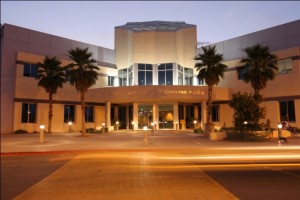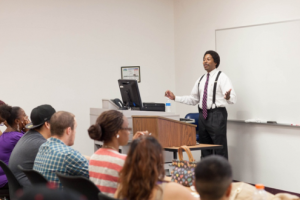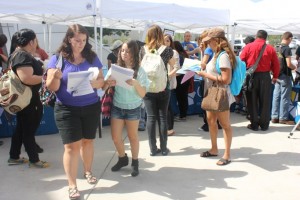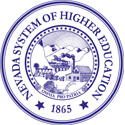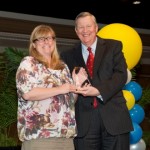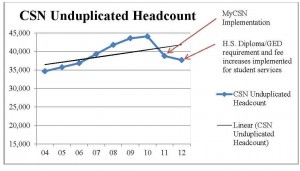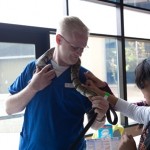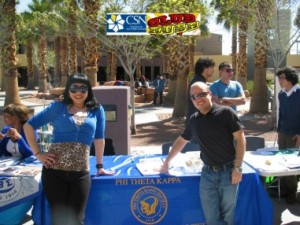Prior to the town halls, CSN issued an open-ended survey question to college employees to solicit questions they would like addressed during the upcoming town hall. CSN President Michael Richards opened each town hall responding to the majority of these inquiries.
Salary & Benefits
Nearly half of survey respondents wanted information on salaries and benefits in the context of the current legislative session. Dr. Richards emphasized that CSN and the Board of Regents’ top legislative priorities are to restore salaries and eliminate furloughs.
The Board of Regents approved in March a new salary schedule for community colleges and Senior Vice President of Finance and Administration Patty Charlton summarized what this will mean for CSN. Many CSN employees have been involved in this effort, which will improve Nevada community colleges’ ability to recruit and retain employees. Those employees currently at the base of their salary schedule will receive a boost to the new minimum levels established by the new NSHE community college salary schedule.
An RFQ has been issued to solicit a firm to conduct a review of each academic and administrative faculty member position to help us align with the new schedule and eliminate salary compression which has occurred over the last few years as salaries have been frozen and new employees brought on board. This will have to be done in phases but we hope to have the vendor’s first set of recommendations by the end of the calendar year.
Dr. Richards clarified that this will not impact classified personnel because they are not under the Board of Regents.
The governor announced this month that he aspires to eliminate furloughs on July 1, 2014. Dr. Richards expressed his position that he hoped this would transpire a year earlier on July 1, 2013.
He noted we are all eagerly awaiting the Economic Forum on May 3, when new revenue projections will be available. Lawmakers will use those projections to build the next biennium’s budget.
Dr. Richards expressed concerns that health benefits were unlikely to improve. The state makes many decisions in which NSHE presidents have little power or input. In December, the PEBP Board decided to keep the two polarizing plans (HMO and high deductible PPO) in place for the next two years.
Funding Formula:
Getting the new funding formula approved is also the Board of Regents’ top priority. Lawmakers have provided positive feedback. Dr. Richards expressed his opinion that this is the only tool on the horizon to address CSN’s longstanding funding inequity.
Remaining issues that need to be addressed are the ‘F’ grade. He expressed his hope that lawmakers would support their interim Committee to Study Higher Education Funding’s recommendation from this summer to fund the “earned” ‘F.’ An earned ‘F’ is one earned by a student that attended the majority of the course but ultimately failed. ‘F’s for non-attendance will not be funded.
The formula stresses course and degree completion and is a complete re-orientation for CSN. We are adapting to this with a number of initiatives in student success, Dr. Richards said.
He noted the media coverage of the north-south rivalry of funds. For the first time ever, there is a southern caucus that has organized itself to address issues cohesively, such as the funding of higher education.
Community college governance:
Dr. Richards described S.B. 391, which was authored by several senators and is supported by the Las Vegas Metro Chamber to move community colleges from the Board of Regents to the Department of Education, which currently governs K-12. This bill has been altered to require a legislative study of community college funding and governance, which will be conducted over the next year, if passed.
Student Success:
Dr. Richards invited CSN’s Vice President of Student Affairs Dr. Santos Martinez to summarize advancements in student success initiatives.
Dr. Martinez emphasized that all of CSN will need to make fundamental changes in the way we currently do retention and recruitment. This is critical not only for the new funding formula but to facilitate a number of national and state initiatives that CSN, Nevada and the Nevada System of Higher Education are involved in.
CSN has a new program underway called CSN College Connections in which CSN staff are taking the admissions, financial aid, career counseling and other services to the high school. CSN piloted this program at Western High School recently with 500 seniors – 300 of which were processed by CSN. The more we can expand this kind of a program, the more we are likely to enroll better prepared students, who can then readily start classes when the semester begins.
Dr. Martinez described upcoming changes to CSN’s advising and counseling system that will move the college toward an intrusive advising case management process.
There is also a new policy on Satisfactory Academic Progress in financial aid that will mean new deadlines for students to get used to for applications and disbursements. CSN is also embarking on a systematic enrollment management process that will begin next year.
Achieving the Dream (ATD):
President Richards updated faculty and staff on our Achieving the Dream process, noting that it is our primary tool for concentrating on student success. Approximately 60 percent of CSN’s ATD team consists of faculty and CSN is very proud of the large number of employees involved in this effort.
Work Climate:
CSN recently completed a new work climate study, the results of which will be discussed at convocation. Dr. Richards underscored that the 2011 work climate study led to many changes, which he outlined in the February Chronicle, and how important this survey is to him and the college in terms of improving our workplace.
E-Learning:
CSN is moving to a new learning management system called Canvas in the fall. Several departments piloted the new system in online and hybrid classes this spring and have reported favorable reviews. Training is already underway.
Dr. Richards discussed the Richard Katz report that was reviewed recently by the Board of Regents and emphasized the majority of recommendations required additional funding. He added that no virtual college will be established. Instead, regents recommended that the chancellor put together a committee to determine which recommendations are feasible. We have nominated several CSN employees for that committee and have yet to hear back.
Diversity:
Dr. Richards stressed that CSN is the most diverse higher education in the state in terms of students, staff and faculty. He emphasized that the college’s commitment to diversity and added that the annual affirmative action report is a critical tool to help us address where we have shortcomings. That 300-plus page report is available on the college’s website. The report is used and discussed at the first meeting of every search committee.
He noted that CSN is an emerging Hispanic Serving Institution (HSI) and that the college has a committee underway to help us achieve HSI status, which would allow us to apply in a competitive process for federal Title V grants that would benefit all students.
Q & A (In order of campus)
Cheyenne Q & A:
Explain the changes to the salary schedule and how that will roll out.
Senior Vice President of Finance & Administration Patty Charlton responded that we are in the process of completing the request for vendors to submit proposals to help us select a firm that can guide us through this process. We have a lot of academic faculty and staff to review. It will be done position, by position. I will be looking at a phased in approach. Please look for more information to come out on this in the near future.
Dr. Richards stated that the college is well aware of the compression and other inequities that have arisen during the last six years of budget cuts.
The study will be completed by 2013 then?
By the end of 2013 and Dr. Richards will look at making any adjustments that we can retro-active to July 1. It will be addressed in phases.
Please tell us more about the senate bill that would move us under the Department of Education.
Dr. Richards stated that the primary emphasis behind the bill is a group of Republican senators. He added that we are endorsing the idea of a study on community college governance and funding.
What’s being done to ease the transfer of CSN students to UNLV?
Dr. Richards stated that we have made positive strides this year. UNLV President Smatresk allocated two UNLV transfer counselors and two admission counselors to reside at CSN to smooth the way. They are working with our faculty and staff to update articulation sheets.
What direction are we moving for custodial and grounds in regards to outsourcing?
Patty responded that the college has relied on some external vendors to provide services. We need to have our facilities look to the standards that our college has set. We have had challenges filling some positions and ensuring that people show up to work. Our students have expressed that it is important to them that their campuses are clean and welcoming.
Dr. Richards stressed that we know how important it is for our students to have clean and welcoming facilities and expressed appreciation to the staff that work night and day to make that happen. He emphasized that we do not have enough people to make that happen. He said that the college has explored outsourcing some facilities maintenance functions. Sherri Payne, CSN’s AVP of Facilities, has a backlog of more than $100 million in deferred maintenance projects. The parking lots need to be refinished, painting needs to be done. Realizing that CSN will not get more money from the state to fund these projects, we need to come up with creative ways to complete them.
When the project goes out to bid, are we required to ensure that the vendor reflects our community?
Sherri Payne responded that when projects go to bid, the college prioritizes using local vendors.
Patty Charlton added that we are working with NSHE to attract more local companies and more minority owned businesses to partner with us as vendors.
Does the college have any additional plans for new bachelor’s degrees?
Dr. Richards responded that we have two in special niche areas and a third underway which will start this fall in cardiorespiratory sciences. The college has not seen sustained community interest for an additional four-year programs.
What is the status of the Northwest campus?
There is a bill in Congress to allow us a land patent for those 40 acres. We’ve been waiting for congressional action on this bill for some time.
There are phones in the classrooms now, but what kinds of safety measures are you discussing for staff that work with the public?
Patty Charlton responded that CSN is looking at obtaining panic buttons, which are already in place in certain areas of the college. CSN will work with departments over the summer on this.
How will you coordinate the implementation of late registration with financial aid?
Dr. Santos Martinez responded that there are plans in place to move up financial aid deadlines and to require students to file by a certain point. If we want students to succeed, we have to get them to plan better. This is going to put responsibility on a lot of faculty and staff. We are going to have to start documenting when students are in class and when they are not. At this point, we’re trying to figure out how to do that.
Charleston Q & A
How do we pay for these student success initiatives?
Dr. Richards responded that many of the items on our student success agenda, such as the new admissions policy implemented last year, do not aid our access mission and also do not have a cost associated with them. There are other policy items, such as getting our recruitment staff out at more locations that do have fiscal challenges.
How can we get our Legislature to understand their behavior impacts our students?
Dr. Richards noted our advocacy efforts and responded that there are many new legislators this year, many of whom are very supportive of the college’s mission.
Is there anyone that classified council can talk to have our salary schedule revised?
Dr. Richards stated that we have expressed the difficulty of hiring and retaining employees at all levels due to the salary and benefit reductions and we have not heard anything about a salary schedule revision at the state level.
Who is making the push to put community colleges under the purview of the Department of Education?
Dr. Richards stated that there was a group of Republican senators who supported the measure in concert with the Las Vegas Metro Chamber.
Will enrollment continue to decrease given that fees aren’t going down anytime soon?
Dr. Richards referred to work conducted by the Institutional Research Department at CSN that has shown a major bubble in enrollment during the Great Recession as many people came back to college to learn new skills. This happened across the nation. If our enrollments had continued on the same slope before the recession, and the bubble had never occurred, we would be about where we are now and we will probably go down even a bit more. Institutional Research Director John Bearce discussed cost-benefits and emphasized the importance that the benefits of obtaining the degree/certificate outweigh the costs of obtaining it.
Can we expand recruitment using students?
Dr. Martinez responded that we’re growing a cadre of students, outstanding students, to assist with recruitment and developing peer-to-peer relationships.
Can you tell us about the savings from PrintWise?
Patty Charlton responded that PrintWise, CSN’s printing program designed to reduce the amount of printing done at the college, has been very successful and cut the cost of paper by almost 60%.
Are there any plans to provide positive education about the new high deductible plan, which has been successful throughout private industry at reducing healthcare costs?
A representative from Human Resources spoke and said there is currently no plan to provide such a seminar but that HR does conduct seminars to explain the benefits.
Dr. Richards emphasized the importance of staying well and making sure to educate yourself about how the PPO and HMO operate.
Can we increase the number of Bio 189 courses offered at the college?
Dr. Richards responded that this has been a problem for many years and not just for the nursing program. There are not enough labs to meet the demand for this course and it has become a bottle neck, particularly for nursing students. When CSN redid the labs at Cheyenne, the college used temporary modules to house labs and kept the modules open after the renovations were complete to increase the amount of lab classes offered. But he noted this is still not enough. Our biggest challenge is space and capacity.
CSN Math & Sciences Dean Sally Johnston added that CSN is currently putting up as many class sections as we can. While enrollment in many areas of the college has decreased, it has increased in biology and that we have maximized our lab space. She noted the backlog of students waiting to get into Bio 189 is smaller than it used to be.
She added that she has been at CSN a long, long time and that she too has been aggravated by furloughs and cuts, but she is joined by many in saying that CSN is our home and we are going to stick with it.
Dr. Richards responded that their support is gratifying.
What are your thoughts on the legislation to add a student regent?
Dr. Richards responded that it would require a change in the state constitution. He noted that prior to Board of Regents’ meetings, meetings are held with student leaders and that students have a lot of input into the system.
Henderson Q & A:
Decisions have been made without talking to faculty that impact the classroom environment and impacting our ability to teach.
Dr. Richards asked if the individual could elaborate.
A couple of years ago, the college redesigned smart classroom podiums and placed them in rooms. In some cases, they blocked the boards or did not work well. These podiums are tall and block students’ view of the board. They require faculty to stand behind them as if we are giving a speech. IT refuses to move the podium.
Patty Charlton, Senior Vice President of Finance and Administration, invited anyone with such complaints to contact her office directly to take care of it if they were unable to obtain a successful response. We cannot block the screens and this needs to be addressed.
In the math department, there are a lot of faculty with really great ideas, but we are being told we cannot present them to you. Can I just email you directly or do I have to go through the chain of command?
Dr. Richards invited the faculty member to email him directly anytime and noted that he must also respect the chain of command and shared governance.
How do we better educate students about scholarship opportunities and make them understand it is worth it to apply?
Dr. Richards stressed it is worth their time and emphasized that we must work to better market scholarships at CSN and in the community.
An individual commented on the need for extended hours of food service at Henderson and improvement of the quality of food. He suggested that the culinary department might be able to provide the service at Henderson.
Another individual added that many of the HVAC students come to the campus to take night classes after a day of work and would appreciate a cup of coffee, which could help with persistence outcomes.
A third individual asked Dr. Richards to expand on S.B. 391 and why lawmakers would want to put community colleges under the Department of Education. Most models consist of community college districts that are self-contained with their own authorities and tax bodies.
Dr. Richards responded that there has been a lot of discussion about this at the Legislature and that the legislation will likely be transformed to a study of community college governance and funding. The Las Vegas Metro Chamber has advocated for this and they have gathered support from lawmakers in the north and south. We hope a discussion comes out of this about national best practices.
Can you tell us about changes in counseling?
Associate Vice President of Academic Services Dr. Hyla Winters explained that in the last year, we have been working to embed the counselors into CSN’s six academic schools. Those counselors will work with declared majors in that school so they can reach out to students and keep them on track. In addition, they will work with select faculty to become department faculty advisors to students. These counselors will be physically located with the school and will begin meeting with their deans in July.
There is another cadre of advisors who will help with general ed students. They will do a circuit and help with general education advisement. Then we have transfer advisors who will help us with transfer. So we have three elements that are being targeted. This is going to take some time to shake out.
How does the ‘W’ get funded or not funded in the new formula?
Dr. Richards responded that he believed the ‘W’ grade, which does not get funded, will eventually be phased out. The new formula focuses on completions. We know there will be instances where an ‘I’ (Incomplete) will be necessary. He emphasized the importance of lawmakers funding the earned ‘F’ grade.
Will faculty need to take attendance then?
Dr. Richards responded that the new formula will likely take us to a place where attendance taking will be required. There are a lot of faculty that already take attendance. He emphasized that there are some lawmakers who do not want to fund ‘F’s at all.
Will the earned ‘F’ be based on completing a certain percentage of classes?
John Bearce replied that lawmakers are looking at financial aid as a model, which uses the 60% threshold.
Dr. Richards added it would be a good idea for faculty to begin taking attendance in the fall if they are not already doing so.
Is CSN doing anything to encourage retired individuals to take courses? It adds much diversity to the classroom experience.
Dr. Richards agreed and noted that at the height of the recession and budget cuts, the Board of Regents withdrew the policy of allowing people over age 65 to enroll at a reduced cost. We are hearing from the state that they want us to educate people who will then use that education to enter the workforce and help diversify/build our economy.
With no more questions, Dr. Richards thanked everyone for taking the time to attend.
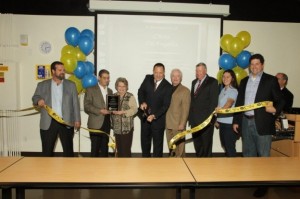 On Wednesday night, we dedicated the air conditioning and technology classroom at the CSN Cheyenne campus to Daikin Applied and Norman S. Wright Mechanical Equipment Corporation, following their donation of a new, state-of-the-art chiller, worth $100,000. The donation allowed us to replace our existing unit, which we then gave to the air condition program to help train CSN students.
On Wednesday night, we dedicated the air conditioning and technology classroom at the CSN Cheyenne campus to Daikin Applied and Norman S. Wright Mechanical Equipment Corporation, following their donation of a new, state-of-the-art chiller, worth $100,000. The donation allowed us to replace our existing unit, which we then gave to the air condition program to help train CSN students.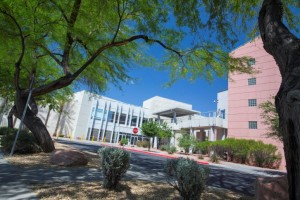 All of you have received a survey, regarding a potential name change that community members have asked us to consider. I’m sure many of you have heard in the media about the Mayor of North Las Vegas John Lee and his hopes that CSN can help bolster economic and workforce development within his city’s limits. An energetic supporter of the community college mission, he’s not alone. And he’s right. We can help. We do a lot in all of the respective communities that we serve that a lot of people don’t know about and we can also do more.
All of you have received a survey, regarding a potential name change that community members have asked us to consider. I’m sure many of you have heard in the media about the Mayor of North Las Vegas John Lee and his hopes that CSN can help bolster economic and workforce development within his city’s limits. An energetic supporter of the community college mission, he’s not alone. And he’s right. We can help. We do a lot in all of the respective communities that we serve that a lot of people don’t know about and we can also do more. Nov. 15, 10 a.m. to 12 p.m., Charleston campus, Ralph & Betty Engelstad School of Health Sciences Building
Nov. 15, 10 a.m. to 12 p.m., Charleston campus, Ralph & Betty Engelstad School of Health Sciences Building  Nov. 16, 11 a.m. to 3 p.m., Henderson Campus
Nov. 16, 11 a.m. to 3 p.m., Henderson Campus
